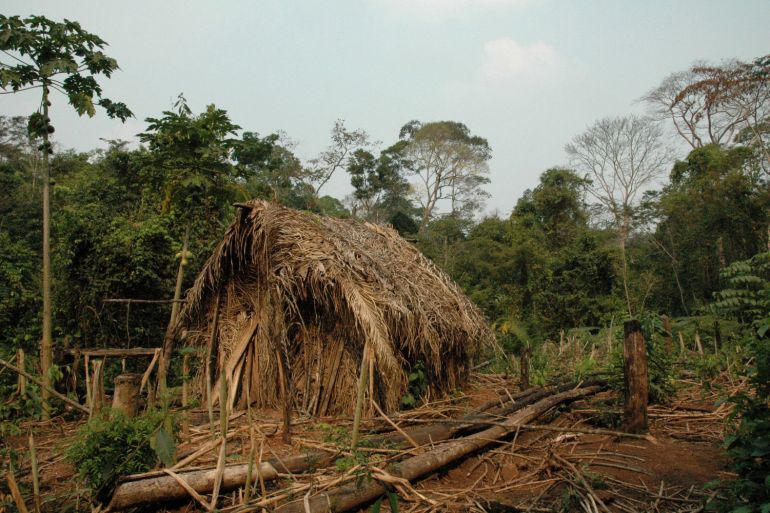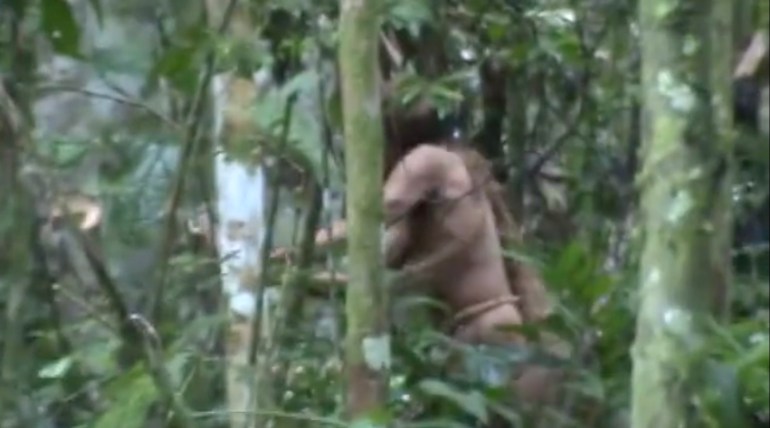‘Hidden genocide’: Death of Indigenous man in Brazil spurs outcry
Death of ‘Man of the Hole’ renews alarm over threats Indigenous people face under President Jair Bolsonaro’s government.

The death of a man believed to be the last member of an uncontacted Indigenous tribe in Brazil’s western Amazon has renewed calls for the Brazilian government to protect Indigenous communities from escalating violence and encroachment on their lands.
International rights group Survival International reported on Sunday that the man known only as the “Man of the Hole” was found dead in Tanaru Indigenous Territory in the northwestern state of Rondonia. He died of apparent natural causes, according to the Brazilian authorities.
Keep reading
list of 4 itemsBrazil’s Lula promises to stop illegal mining on Indigenous lands
Indigenous lands block deforestation in Brazil, new study finds
Brazil authorities doing little to prevent deforestation: Report
The man, whose name was derived from his habit of building deep holes, was the last surviving member of a tribe that saw its people “massacred in a series of attacks from the 1970s onwards” and had been living in total isolation for years, Survival International said.
Fiona Watson, the group’s research and advocacy director, said people knew very little about the man, including what he called himself, the name of his tribe, or what language he spoke.
“All we know about him, from piecing the evidence together, is he was the sole survivor of several genocidal attacks,” she told Al Jazeera in an interview, describing him as a symbol of “a very hidden and secret genocide” as well as of “extraordinary courage and resilience”.

News of the man’s death prompted an outpouring of grief for many, while also placing a renewed focus on policies of far-right President Jair Bolsonaro’s government that Indigenous leaders and activists say are putting them at risk of attacks and forcing them off their territories.
“The Indigenous territories are being invaded because people feel tremendous impunity, the invaders. With Bolsonaro … people feel very emboldened,” said Watson.
“I think this is a wake-up call because … a very important part of rich human diversity is gone forever with the death of the Man of the Hole,” she added. “The Brazilian government has to treat this as an emergency and put funding and put experienced field staff, more staff, on the ground to determine exactly where these people are and to set about demarcating and protecting their land.”
‘Intensified brutality’
Brazil is home to more than 800,000 Indigenous people from over 300 distinct groups, according to data from the last census in 2010 cited by the Articulation of Indigenous Peoples of Brazil (APIB) rights group.
For years, Indigenous leaders have raised alarm over the threats their communities face in the South American nation, particularly in areas with little government oversight that farmers, miners, poachers and others are seeking to control and exploit.
Indigenous people have accused Bolsonaro and his allies of adopting policies that seek to displace them in favour of the groups illegally encroaching on their territories, while loosening environmental protections in critical areas such as the Amazon rainforest. The far-right leader has supported more mining in the Amazon, saying it will stimulate the economy.
The Indigenous Missionary Council, a group affiliated with the National Conference of Bishops of Brazil, recorded 305 cases of “possessory invasions, illegal exploitation of resources and damage to property” on Indigenous territories last year, affecting 226 Indigenous lands in 22 Brazilian states. That is up from 109 such incidents in 2018, the year before Bolsonaro took office – a 180 percent increase.
“In addition to the quantitative increase in cases and lands affected by illegal activities of miners, loggers, hunters, fishermen and land grabbers, among others, the invaders intensified their presence and brutality of their actions in Indigenous territories,” the council said in a report this month (PDF). “These violent and criminal attacks, often with heavy weapons, have been repeatedly reported by the Indigenous people and ignored by the federal government, which continued to stimulate mining activities in these territories.”
In August 2021, APIB filed a complaint asking the International Criminal Court to investigate Bolsonaro for “genocide” and “crimes against humanity” amid the deteriorating situation, accusing his government of publicly encouraging “the criminal invasion of traditional [Indigenous] territories”.
The state’s policies expose Indigenous peoples “to death threats, murder, invasions, destruction of their territories and contamination of resources”, the group said in a report (PDF) last year, while “Bolsonaro’s discourse is a major driver of those attacks”.
Land protection
In a written statement to Al Jazeera, Brazil’s foreign affairs ministry said the government is committed “to protect the human rights of all Brazilians, including Indigenous peoples”. The country’s Indigenous affairs agency, known as FUNAI, invested $15.9m ($82.5m Brazilian real) for the “supervision of Indigenous lands” between 2019 and 2021, the ministry said in an email.
FUNAI also uses satellite imagery to monitor illegal activities. “Such information enables FUNAI to assess unlawful occurrences on Indigenous lands and to plan actions of territorial protection, providing for a quick reaction,” the statement said.
But Andrea Carvalho, a senior research assistant at Human Rights Watch (HRW) in Brazil, said there has been a clear escalation of attacks on Indigenous people and their lands in recent years. “This is driven by disastrous policies related to the protection of the environment and Indigenous rights in Brazil,” she told Al Jazeera.
The Bolsonaro administration has weakened Brazilian environmental agencies and FUNAI, said Carvalho, explaining that one of the ways it has done this is by removing experienced civil servants from leadership positions. Now, more than 200 Indigenous territories in Brazil are awaiting demarcation, the legal protection of lands, she added.
“Historically it does take a lot of time to conclude a demarcation, but this administration even during the election campaign in 2018 pledged not to designate Indigenous territories, and that pledge was delivered. Since Bolsonaro took office, Brazil hasn’t demarcated any new Indigenous territories,” Carvalho said.
‘We keep fighting’
Sonia Guajajara, an Indigenous activist running to be a federal deputy in Brazil’s upcoming elections, told Al Jazeera that while Indigenous people have never been a priority for Brazilian governments, Bolsonaro’s administration is “avowedly anti-Indigenous”.
Amid the worsening wave of attacks, Guajajara said the demarcation of Indigenous territories is critical. “It is essential that we have our constitutional right to land guaranteed, because only then will we be able to preserve our culture, our ways of living and our life,” she said in an email.
“We keep fighting and resisting, which is why I and so many other [Indigenous people] are running for public office in these elections. We want to occupy the spaces of power.”
But as Bolsonaro faces off against former left-wing President Luiz Inacio Lula da Silva in October polls, Carvalho said Indigenous issues have been largely left out of the election campaign so far. “It’s now up to the candidates to tell voters, to tell Brazilians, how they are planning to actually protect Indigenous rights and how to strengthen federal agencies – and how they plan to dismantle the criminal networks that are driving environmental devastation,” she said.
Watson at Survival International urged international pressure on Brazil to better protect Indigenous lands after the death of the “Man of the Hole”, who she said was only able to “carry on his way of life” due to the government’s protection of the Tanaru Indigenous Territory.
“I think his story is the ultimate illustration of what can happen to Indigenous peoples if we don’t protect their lands,” she said.